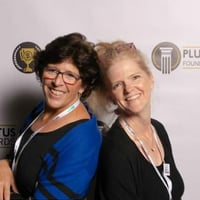As children of God, we each possess a unique blend of gifts and talents. While we are born with specific spiritual gifts and natural abilities, we also acquire more skills as we learn, practice, and have new experiences.
“I wish that all of you were as I am. But each of you has your own gift from God; one has this gift, another has that.” 1 Corinthians 7:7 NIV
If you run a thriving small business or enjoy a successful career, your work is likely well-aligned with many of your gifts and talents. But the opposite may be true if your business is struggling, or you consistently find your job boring or frustrating.
Job "burnout" may indicate that your work doesn't match your strengths.
It's essential to recognize your abilities and skills, whether you're a young adult looking at career paths, someone considering a job change, or a budding entrepreneur thinking of starting a business. It would be best if you also paused to assess your strengths when you trade your time for money and take on an extra part-time job or "side gig" to boost your income.
Matching your gifts and talents with a profession or business opportunity can improve the odds of your success and minimize the regrets you have about your work choices.
"If you love your job, you'll never work a day in your life" may be cliche, but job satisfaction can positively impact your personal and financial health, along with preserving relationships.
Let's look at how you can determine your gifts, identify natural and acquired talents, and figure out how they could impact your work. Then, we'll share how you can take that information and use various tools to match it to potential career pathways or business opportunities.
Moving Forward by Looking Back
One of the most exciting parts of career and business exploration is considering all your options and picturing your future. But don't make the mistake of trying to move ahead with your plans without spending time in prayer and self-reflection. (And if you haven't practiced self-reflection before, this is a great time to learn that skill too!)
We suggest that you record your responses to the questions below. It would be best to take notes when talking with trusted family members, friends, and mentors also.
1. What are my spiritual gifts?
Believing in Jesus Christ provides you with at least one spiritual gift. Spiritual gifts are your God-given abilities. Examples you'll find in scripture include leadership, encouragement, giving, teaching, service, wisdom, knowledge, and faith.
“We have different gifts, according to the grace given to each of us. If your gift is prophesying, then prophesy in accordance with your faith; if it is serving, then serve; if it is teaching, then teach; if it is to encourage, then give encouragement; if it is giving, then give generously; if it is to lead, do it diligently; if it is to show mercy, do it cheerfully.” Romans 12:6-8
You may come across online assessments or tools that help people discover their spiritual gifts. But uncovering your abilities is best done through self-discovery, discussions with others, and prayer.
The Crossroads Church suggests you do the following to determine your spiritual gifts:
- Ask yourself: What opportunity is right in front of me to bring grace to someone else today?
- Ask a friend: What do I consistently do that relieves, frees, and blesses you?
- Ask God: Will you show me my spiritual gifts and allow me to put them to work?
When you've discovered your gift(s), record what you've learned; you can use this information as we move forward.
Related Reading from the Medi-Share Blog: What is Your Spiritual Gift?
2. What natural talents and acquired skills do I have?
We all have innate abilities based on our genetic makeup. And as we learn, grow, and have different experiences throughout life, we develop various expertise and transferable skills. The natural and acquired talents we foster give us the physical and mental capability to get things done - including tasks that help us to be successful at work.
Can you name the talents you were born with and skills you've mastered over the years? Are you artistic, athletic, or musical? Maybe you're a great public speaker or the first person called on when it's time to organize an event.
You could be a natural when it comes to hands-on projects, a whiz with numbers and money, or a highly compassionate person. Brainstorm a list of your abilities and skills, including technical and soft skills. Record everything you can think of to help you identify your talents.
- What comes easy to you, and what do you enjoy doing?
- How do you spend your free time, and what do you spend your money on?
Then, ask trusted family members, friends, and co-workers to give honest feedback about your strengths. Others may point out skills you've already recognized, but there's a good chance they'll help you grow your list.

3. What is your current career path, and why did you choose it?
Take a few minutes and write down your path to your current career.
- Did you go to college?
- Were you in an apprentice program?
- What jobs have you held over the years?
Map out your work path and describe the choices you made over time to reach your current employment situation.
Do your gifts and abilities match your current career path?
You've already identified your gifts and talents. Now, think about which gifts and skills you use in your current job. Is your work well-aligned with your abilities, or do you notice you're not using many of your talents in your profession?
Make a list of the talents you use in your work and the ones you don't. This could supply essential information as you consider future employment and business options.
Do aspects of your career path concern you?
You're likely reading this article because you are thinking about career options or business opportunities.
While your parents and grandparents may have worked in the same profession (often with the same employer) for many decades, that isn't the case for many people now. Changing employers and careers and embracing entrepreneurship are pretty common.
Work to figure out the root cause for why you want to make a career change now. Are you unhappy or frustrated with the work you’re doing, or is it an issue with your current employer? It may be a case of job burnout that you need to address.
You could also be happy with your current work situation but excited to try something new. The most important thing is that you take time to reflect on the past before making a change that could significantly affect your future.
4. What are your hopes and dreams for the future? What goals do you have?
After reflection, it's time for forward thinking. Spend time writing out what you want your years ahead to look like and create a list of goals. This is a brainstorming exercise, so don't limit your thinking. It's good to dream and envision your future! You can revisit your list of aspirations in a few days to narrow it down to what you think is realistic and reasonable.
Now, label each goal in terms of importance to you. Is the goal extremely important, very important, important, or somewhat important? Then, reorganize your goal list so that what matters most is at the top. You want to ensure your choices will best meet what you've identified as crucial objectives for your future.
Matching Your Gifts and Skills to a Business Idea or Career Path
You've done a lot of great work up to this point! You've reflected on your life and have a better understanding of your gifts and talents and how they may affect your career. You also have a good idea of what you want to achieve in the future.
While we think it is an excellent use of your time to work on matching your gifts and skills to various professions and business options on your own, there are also tools you can use to aid in the process.
If you're trying to match your abilities with a small business idea, read our article
"Which of My Business Ideas is Best to Pursue." It will guide you through essential questions to ask yourself to help you make smart entrepreneurial decisions. (You can also download a pdf of the article to make the process easier.)
Career aptitude assessments help people figure out career paths and jobs they may excel in and enjoy. In addition to taking your abilities and preferred tasks into account, these tests may also include questions that assess your personality traits and values.
The tests may generate a list of careers and may consist of some you've never considered in past job searches. But remember that the results should just be part of your research on profession or business options.
While these tools can supply greater career awareness, don't make any final decisions about your future from a free online tool without doing your due diligence on a given profession.
Let's look at five free career assessments available to you.
Sponsored by the U.S. Department of Labor, this website has information to help you explore various careers. The free Skills Matcher test asks you to rank your ability (beginner, basic, skilled, advanced, expert) on various skills.
The results provide dozens of career options that may interest you. The information includes:
- Titles of careers that often require skills and knowledge close to how you ranked yourself.
- Median salary for the career.
- Level of education that's usually needed to enter the career.
- How fast the career is expected to grow (which can help you identify job market demand for that career.)
Also, consider taking the Interest Assessment and the Work Values Matcher to get even more information you can use to make potential career decisions.
2. Truity Career Personality Profiler
This free 15-minute test claims to help you find the best career for your interests and aptitude. According to the Career Test FAQs on their website, it "measures your personality traits, strengths, values, and interests, and uses those scores to match you with a list of ideal careers."
You'll receive a brief report of results; if you choose, you can pay a fee to get a more in-depth report.
This free 5-10 minute career aptitude test can help you better understand your job personality. You'll learn the types of work environments and occupations that may fit you best.
Results are based on your responses to a variety of images showing different tasks. You're asked to imagine yourself performing the tasks shown and decide whether you want to do them. Examples include going into an office, researching, taking creative photographs, and more.
4. The O*Net Interest Profiler
This profiler is another free online tool sponsored by the U.S. Department of Labor. You'll answer 60 questions by responding about how you would feel doing each type of work (strongly dislike, dislike, unsure, like, strongly like).
Your Interest Profiler results are broken into categories of interests - realistic, conventional, social, enterprising, investigative, and artistic. You can click on each category you rank in to figure out the types of careers that may fit your interests.
It'll take about 30 minutes to complete this free career test. You'll be asked questions about your personality, interests, and talents. Questions also focus on the type of work environment you prefer and your career values.
You'll be given a list of careers that may best fit your abilities, and you can research more about various career options on the website.
Finding Work That Uses Your God-Given Gifts and Talents
The reality is that most of us will spend at least three or four decades working. What seemed like the best professional path or excellent business idea in your early 20s may not be the best fit for the person you are now.
Taking the time to reflect on your natural gifts and the abilities you've acquired through schooling and work may lead you down a new career path. If your job doesn't fulfill you or you feel a calling to do a different type of work, research your options.
While it's important to make job moves that won't jeopardize your financial future, you may be able to make changes to your lifestyle, allowing you to pursue new career aspirations too. The work you put into discovering more about yourself is the first step in successfully moving forward.






